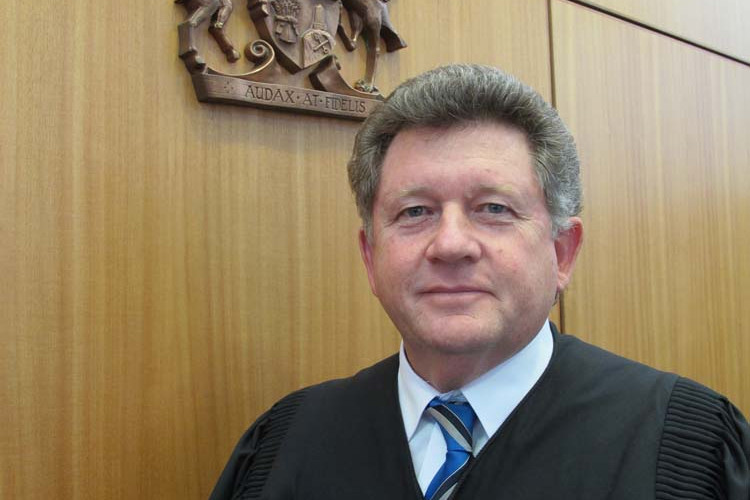Community & Business
18 December, 2024
Mareeba Magistrate retires
AFTER 20 years of deliberations, Magistrate Tom Braes retired on 5 December from the Mareeba Court, ending what was, at times, a frustrating and challenging role in keeping the peace in the community.

From digitising the court system, to the growth of DNA, video and camera evidence, much had changed during Mr Braes’ long and distinguished career.
Magistrate Braes began work in Mt Isa, as a courthouse clerk in the early 1970s. He was transferred to Townsville and worked with the then Northern Crown Prosecutors Office, now known as the Director of Public Prosecutors (DPP) and was admitted as a lawyer in 1982.
“I then resigned and went into private practice, initially in Charters Towers for five years, then relocated back here to Mareeba in 1988, and worked in private practice until October 11, 2004,” he said.
In the Magistrate’s Court, Mr Braes was at the coalface, in a court considered to be the social reflection of the community.
“We’re the local court, aren’t we, we’re the one that has most contact with the people, we do 90-something per cent of the work.”
It is also a place where you see the best and the worst of society, and the shifts and changes within it.
“The law is always changing, sure,” he said. “But the thing that I’ve noticed, I think … is the breakdown of the family unit.”
The use of the term “uninvolved parenting” had become more and more prevalent in reports made to the juvenile court system, and it was a “cause of many issues”.
“If the family unit could be strengthened, if people could be responsible for themselves and their children, then we might see some sort of turning of the wheel, but I don’t hold out hope for that presently I’m afraid,” he said.
He was also alarmed at the “exponential growth of domestic violence … that one is just out of control”.
On the plus side he has seen lots of advances in forensic investigations.
“DNA, audio recordings, and videos which police now have, there’s vision everywhere, so when someone says ‘oh I wasn’t there, they [the police] can say ‘oh, really, well take a look at this…’,” he said with a chuckle.
Still smiling, he recalled another popular excuse, “being in the wrong place at the wrong time”.
“This man was in a retail shop, hiding behind a motorbike, with an iron bar,” he said. “Police responded and came in and he tried to run and they apprehended him - to put it mildly - he still had the bandage, where the taser had hit him.
“I said to him the phrase applied when you’re walking down the street and a tree branch falls on your head. That’s being in the wrong place at the wrong time!”
Overall, the most distressing matters that came before him were deaths cause by road vehicle crashes.
“For example, a person, for argument’s sake, is driving a motor car and through momentary inattentiveness, kills their friend. There are no winners. It doesn’t matter what the penalty is, everybody is affected by the tragedy, and everybody in the courtroom ... is just there, and you’re thinking, ‘how am I going to impose a sentence which is a), acceptable to the community, and b) acts as a deterrent.
“They’re always difficult to deal with. But generally, you can’t afford to become too emotionally attached, because you wouldn’t last long.
“You’re human, you can’t help but be affected by the situations people find themselves in, but you have to deal with it, and essentially put it behind you, and deal with the next one.”
He points out that a magistrate can hear between 5,000 to 10,000 matters a year, so they have to be efficient. In his circuit, he also travelled to Atherton, Mossman (his place of birth), Mt Garnet and Georgetown.
Does he feel he has made an impact?
“You try to tell young people that they can draw a line in the sand, that they don’t have to keep (offending), that they can do something for themselves,” he said.
“So it can be very frustrating when ... they repeat the same indiscretions. Particularly the children. You see them come through as 12-year-olds, then 15, 18 and then 28-year-olds.
“But occasionally you’ll see or hear about people – they might even drop you a note, saying, ‘that was the best thing that ever happened to me, when you made me do that community service, or when you sent me to jail. That was what I needed’.”
He always liked to finish a matter on a positive note also, reminding the offender that “all right you have to pay the penalty today but, there is still an opportunity to do something for yourself.”
As for road offences, Mr Braes cannot emphasise enough, to tradies in particular, the importance of a driver’s licence.
“I say, ‘chuck it in your toolbox and regard that as the most important tool that you’ve got. You go and pay a fortune for spanners and drills and equipment, but just regard that driver’s licence as more important than all of those things’.”
For now, Tom Braes is putting the courts aside, and spending time with his four daughters and five grandchildren, all of whom are local.
He’ll keep on “Lioning” – coordinating Lions Club activities such as annual Metrogaine, Christmas raffles and cakes; and collecting spectacles for recycling, among other things. He will continue as patron of the Men’s Shed, Chair of the Qld and Northern NSW Lions Medical Research Foundation, and Chair of the Mt Emerald Wind Farm Community Benefit Fund.
Next year he will also take on the position of chair of the Lions Southern Tablelands zone.
“I’ll be a zonie,” he said with a grin.


